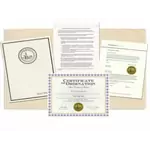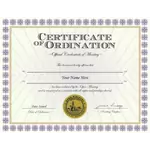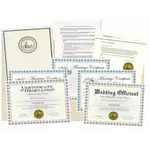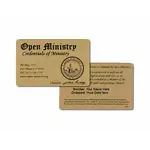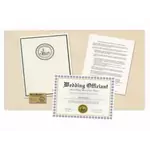State Marriage Laws and Information
Since 2010, Open Ministry has been ordaining and helping people all over the world perform weddings, ceremony and other sacerdotal duties. This page focuses on requirements and information for Washington DC; Scroll down to the bottom of the page for links to other states.
How to get ordained and perform a wedding in Washington DC
If you are planning to get ordained in Washington DC or you have been asked to perform a wedding ceremony in Washington DC, or simply need to to find an ordained minister in Washington DC to perform your wedding ceremony.
This ordination information forWashington DC is provided below in an easy five step layout which is designed help walk you through the most common steps on registering to become a minister for Washington DC and how perform a wedding ceremony in Washington DC.
Step 1 - Get Ordained Online for free with Open Ministry
Step 1: Get Ordained in Washington DC with Open Ministry
Getting ordained in Washington DC has never been simpler or more affordable. Open Ministry provides a fast, free ordination you complete entirely online-often in under 12 hours-with digital confirmation delivered free and printed certificates for a modest lifetime fee.
When you get ordained in Washington DC through Open Ministry, you’ll enjoy:
- Complete online in minutes - no paperwork required.
- Free emailed ordination - get it almost instantly.
- Printed certificate options - check out the store for info.
- Approved credentials - valid in every Washington DC county.
- Established network - thousands of ordained ministers since 2010.
How It Works
- Select the Get Ordained in Washington DC button.
- Enter your information in our secure portal.
- Get your digital ordination and optionally order printed certificates.
As a recognized ordained minister in Washington DC, you’ll have the legal right to solemnize marriages and lead ceremonies across the state.
Secure Your Washington DC Ordination Now
Free digital ordination-printed certificates available for a small fee.
Step 2 - Contact The County Clerk
How to Register to Officiate a Marriage in Washington DC
Next, contact the office of your local marriage authority (typically your county clerk in Washington DC). Let them know that you are a ordained minister with Open Ministry in California, and ask them what information the will require of you, to officiate a marriage in Washington DC. Most clerks and governing agencies may require that you present them with a physical copy of your ordination record.
When speaking with the county clerk; it can be helpful to use the following phrases.
- What agency or department issues marriage licenses in your county and how may I contact them?
- I am an ordained minister with a church in California and I would like to register as a wedding Officiant in your county to perform and solemnize weddings.
- I have my Letter of Good Standing and/or Ordination Credential as proof of my ministry and ordination.
- What additional documentation is required for me to register as a wedding Officiant in your county or state?
Step 3 - Get registered to perform a Marriage
License to perform a wedding in Washington DC
After you've contacted your marriage authority, you will want to visit our bookstore to get physical copies official credentials for presentation and your records. (See Washington DC State Statutes for More Specific Requirements )
When registering in Washington DC you may be asked to display proof of your ordination to the county clerk's before they will accept the marriage license as having been legally solemnized. We typically advise ministers of Washington DC to get a Complete Minister Package for Washington DC which includes your Letter of Good Standing (the live signed and notarized physical copy of your standing with our ministry).
Having your physical copies credentials provides peace-of-mind to couples and others that you intend to marry. Additionally, we recommend at least 4 weeks between the date of the wedding ceremony and your order, to ensure that you receive all of your materials and are able to register in time. Please note that every state and county can impose different requirements. This may include other nominal fees and additional paperwork that may need to be completed before the ceremony can take place.
It is important to note that some county clerks in Washington DC may require wedding officiants to attach a statement which asserts some of the elements in the marriage license upon submission, including the following:
- The time and location at which the wedding took place
- The names and places of residence of all official witnesses
- The religious organization in which the officiant is ordained
- The printed name and address of the officiant
Please note that, when filling out a marriage license, that Washington DC State may request you use the title "Minister" or "Reverend". The County Clerks may also require you enter your denomination, you can use "Non-Denominational". Failing to state a denomination may result in rejection and could require a duplicate marriage license.
Step 4 - How to Perform the Wedding
How to perform a wedding in Washington DC
Once you have completed of the above, you are ready to perform the wedding! Be sure that the couple has picked up their Washington DC state issued marriage license from the appropriate office. Washington DC marriage licenses valid for a set number of days, and there may be a waiting period between when the couple receives the marriage license in Washington DC and when the ceremony may be legally performed in Washington DC. This information should be written on the license and followed to ensure the ceremony is recorded properly.
Please be aware that the signed license must be returned to the issuing office in Washington DC before the time limit is reached. Check the marriage license for the exact dates. Once the the previous matters have been addressed, officiating a wedding in Washington DC can be a great and wonderful experience.
If you have any comments or issues as a wedding officiant in Washington DC, or after you have been ordained, or would like to just asking for guidance on how to perform a wedding ceremony in Washington DC. We recommend that all new Washington DC wedding ministers who have issues or concerns about the ceremony read over our helpful guides.
Washington DC
46-406 Persons authorized to celebrate marriages
(a) For the purposes of this section, the term:
(1) "Religious" includes or pertains to a belief in a theological doctrine, a belief in and worship of a divine ruling power, a recognition of a supernatural power controlling man's destiny, or a devotion to some principle, strict fidelity or faithfulness, conscientiousness, pious affection, or attachment.
(2) "Society" means a voluntary association of individuals for religious purposes.
(b) For the purpose of preserving the evidence of marriages in the District of Columbia, every minister of any religious society approved or ordained according to the ceremonies of his religious society, whether his residence is in the District of Columbia or elsewhere in the United States or the territories, may be authorized by any judge of the Superior Court of the District of Columbia to celebrate marriages in the District of Columbia. Marriages may also be performed by any judge or justice of any court of record; provided, that marriages of any religious society which does not by its own custom require the intervention of a minister for the celebration of marriages may be solemnized in the manner prescribed and practiced in any such religious society, the license in such case to be issued to, and returns to be made by, a person appointed by such religious society for that purpose. The Clerk of the Superior Court of the District of Columbia or such deputy clerks of the Court as may, in writing, be designated by the Clerk and approved by the Chief Judge, may celebrate marriages in the District of Columbia.
(c) No priest, imam, rabbi, minister, or other official of any religious society who is authorized to solemnize or celebrate marriages shall be required to solemnize or celebrate any marriage.
(d) Each religious society has exclusive control over its own theological doctrine, teachings, and beliefs regarding who may marry within that particular religious society's faith.
(e)(1) Notwithstanding any other provision of law, a religious society, or a nonprofit organization that is operated, supervised, or controlled by or in conjunction with a religious society, shall not be required to provide services, accommodations, facilities, or goods for a purpose related to the solemnization or celebration of a marriage, or the promotion of marriage through religious programs, counseling, courses, or retreats, that is in violation of the religious society's beliefs.
(2) A refusal to provide services, accommodations, facilities, or goods in accordance with this subsection shall not create any civil claim or cause of action, or result in a District action to penalize or withhold benefits from the religious society or nonprofit organization that is operated, supervised, or controlled by or in conjunction with a religious society.
Title 46: Domestic Relations - Subtitle 1: General - Chapter 4: Marriage
CREDIT(S) (Mar. 3, 1901, 31 Stat. 1392, ch. 854, § 1288; Apr. 23, 1904, 33 Stat. 297, ch. 1490, § 1; June 25, 1948, 62 Stat. 991, ch. 646, § 32(a), (b); May 24, 1949, 63 Stat. 107, ch. 139, § 127; July 5, 1966, 80 Stat. 264, Pub. L. 89-493, § 13(a), (b); July 29, 1970, 84 Stat. 570, Pub. L. 91-358, title I, § 155(a); Jan. 26, 1982, D.C. Law 4-60, § 2, 28 DCR 4768; Mar. 3, 2010, D.C. Law 18-110, § 2(d), 57 DCR 27.) HISTORICAL AND STATUTORY NOTES Prior Codifications 1981 Ed., § 30-106. 1973 Ed., § 30-106. Effect of Amendments D.C. Law 18-110 added subsecs. (c), (d), and (e). Legislative History of Laws Law 4-60 was introduced in Council and assigned Bill No. 4-251, which was referred to the Committee on the Judiciary. The Bill was adopted on first and second readings on September 15, 1981, and September 29, 1981, respectively. Signed by the Mayor on October 30, 1981, it was assigned Act No. 4-106 and transmitted to both Houses of Congress for its review. For Law 18-110, see notes following § 46-401. DC CODE § 46-406 Current through January 11, 2012
46-406 Persons authorized to celebrate marriages
(a) For the purposes of this section, the term:
(1) "Religious" includes or pertains to a belief in a theological doctrine, a belief in and worship of a divine ruling power, a recognition of a supernatural power controlling man's destiny, or a devotion to some principle, strict fidelity or faithfulness, conscientiousness, pious affection, or attachment.
(2) "Society" means a voluntary association of individuals for religious purposes.
(b) For the purpose of preserving the evidence of marriages in the District of Columbia, every minister of any religious society approved or ordained according to the ceremonies of his religious society, whether his residence is in the District of Columbia or elsewhere in the United States or the territories, may be authorized by any judge of the Superior Court of the District of Columbia to celebrate marriages in the District of Columbia. Marriages may also be performed by any judge or justice of any court of record; provided, that marriages of any religious society which does not by its own custom require the intervention of a minister for the celebration of marriages may be solemnized in the manner prescribed and practiced in any such religious society, the license in such case to be issued to, and returns to be made by, a person appointed by such religious society for that purpose. The Clerk of the Superior Court of the District of Columbia or such deputy clerks of the Court as may, in writing, be designated by the Clerk and approved by the Chief Judge, may celebrate marriages in the District of Columbia.
(c) No priest, imam, rabbi, minister, or other official of any religious society who is authorized to solemnize or celebrate marriages shall be required to solemnize or celebrate any marriage.
(d) Each religious society has exclusive control over its own theological doctrine, teachings, and beliefs regarding who may marry within that particular religious society's faith.
(e)(1) Notwithstanding any other provision of law, a religious society, or a nonprofit organization that is operated, supervised, or controlled by or in conjunction with a religious society, shall not be required to provide services, accommodations, facilities, or goods for a purpose related to the solemnization or celebration of a marriage, or the promotion of marriage through religious programs, counseling, courses, or retreats, that is in violation of the religious society's beliefs.
(2) A refusal to provide services, accommodations, facilities, or goods in accordance with this subsection shall not create any civil claim or cause of action, or result in a District action to penalize or withhold benefits from the religious society or nonprofit organization that is operated, supervised, or controlled by or in conjunction with a religious society.
Title 46: Domestic Relations - Subtitle 1: General - Chapter 4: Marriage
CREDIT(S) (Mar. 3, 1901, 31 Stat. 1392, ch. 854, § 1288; Apr. 23, 1904, 33 Stat. 297, ch. 1490, § 1; June 25, 1948, 62 Stat. 991, ch. 646, § 32(a), (b); May 24, 1949, 63 Stat. 107, ch. 139, § 127; July 5, 1966, 80 Stat. 264, Pub. L. 89-493, § 13(a), (b); July 29, 1970, 84 Stat. 570, Pub. L. 91-358, title I, § 155(a); Jan. 26, 1982, D.C. Law 4-60, § 2, 28 DCR 4768; Mar. 3, 2010, D.C. Law 18-110, § 2(d), 57 DCR 27.) HISTORICAL AND STATUTORY NOTES Prior Codifications 1981 Ed., § 30-106. 1973 Ed., § 30-106. Effect of Amendments D.C. Law 18-110 added subsecs. (c), (d), and (e). Legislative History of Laws Law 4-60 was introduced in Council and assigned Bill No. 4-251, which was referred to the Committee on the Judiciary. The Bill was adopted on first and second readings on September 15, 1981, and September 29, 1981, respectively. Signed by the Mayor on October 30, 1981, it was assigned Act No. 4-106 and transmitted to both Houses of Congress for its review. For Law 18-110, see notes following § 46-401. DC CODE § 46-406 Current through January 11, 2012

